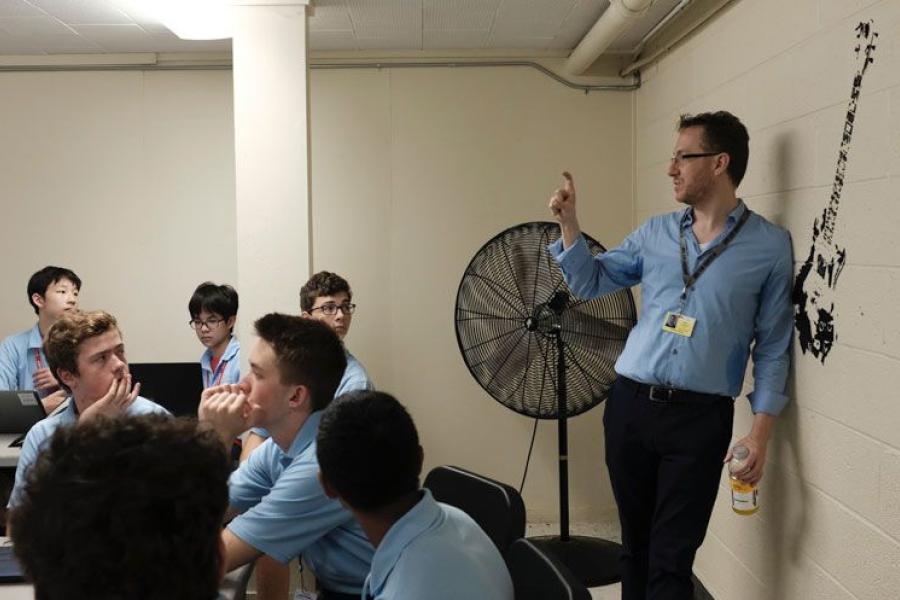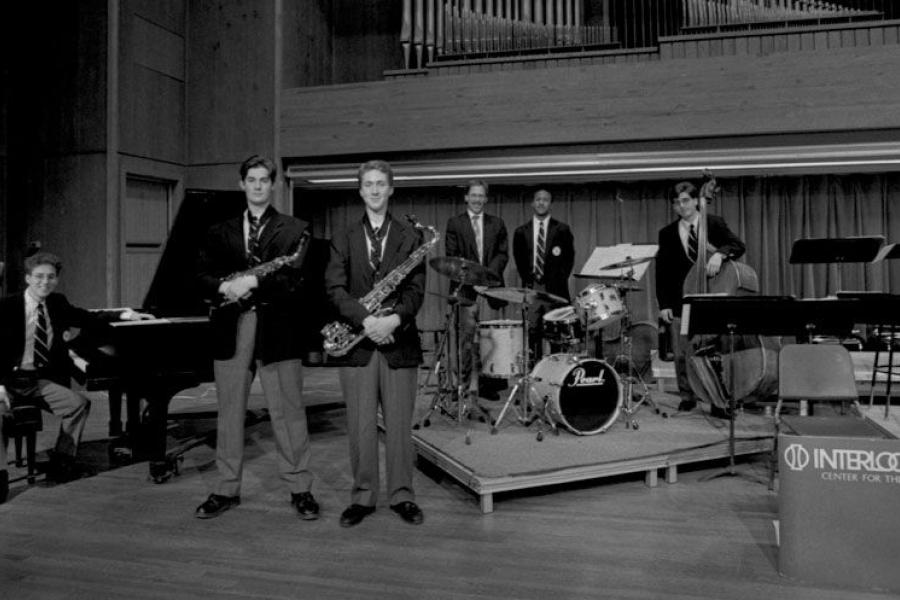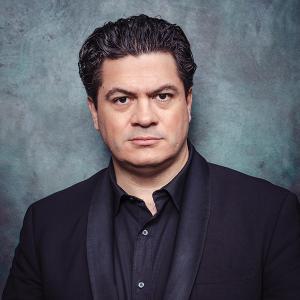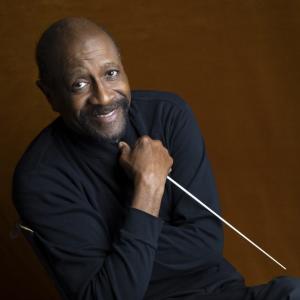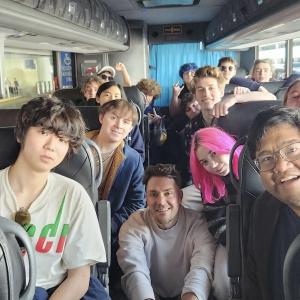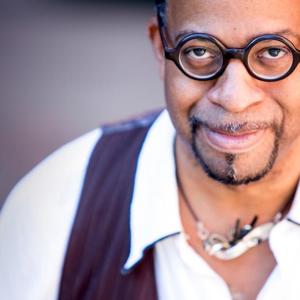Interlochen Online's next session begins May 6—enroll in any course or certificate program now.
Camp faculty profile: Jonathan Perkins
Interlochen Arts Camp instructor of Music Production and Engineering shares the importance of hard work and networking.
Jonathan Perkins (IAA 93-95) always had a passion for music, but finding his niche has been somewhat as of an odyssey.
Perkins came to Interlochen Arts Academy as a composition major. He then headed to the University of California Los Angeles as a jazz pianist, but graduated from Berklee College of Music with a music production and engineering degree. His career has seen him dabble in all three.
Today, Perkins is a well-known songwriter/producer whose credits include Jay Sean, The Chainsmokers, Nicki Minaj, and Big Time Rush. Perkins has also composed for television; in 2010, he wrote the score of the Emmy Award-winning documentary Doing Business in China.
Perkins recently returned to campus to serve as an instructor in the new Music Production and Engineering program at Interlochen Arts Camp. We caught up with him to learn more about his career, time at Interlochen, and advice for students.
Tell us a little bit about your time here as a student.
I started at Interlochen as a junior in the fall of 1993, and I was a composition major. During my senior year, I got kind of sucked into the jazz program by Bill Sears. My time here was great, for the most part.
I have an incredibly positive memory that my life changed when I came here. It was great to be surrounded by other music nerds like me. Everyone at Interlochen tells the story about how we're “hometown heroes.” When we come here, we're surrounded by tons of other hometown heroes, and we're very humbled by the experience. That happened to me as well. It both brought me out of my shell and humbled me quite a bit.
In addition to loving Interlochen so much just for what it is and what it inspires in all of its students, I love Interlochen for the additional support I got from the community during my senior year. My senior year started off rough because I was going through a difficult time personally. I don't know that I would have gotten through it as well as I did without the entire community just wrapping their arms around me.
As a student at Interlochen, you studied music composition, piano, and jazz. How did you end up becoming interested in the production side of music?
I had always been interested in contemporary music. I was a huge fan of Prince and Peter Gabriel. I liked Peter Gabriel for the worldliness of his music: He traveled around a lot and gathered a lot of traditional music at the places he traveled, so that influenced his music heavily. And Prince for obvious, genius, incredible-musician reasons.
It wasn't really until a couple of years after graduating from Interlochen, while I was at UCLA, that I became interested in pursuing contemporary music as a career. There was a nice jazz program at UCLA at the time. They had legends like Kenny Burrell teaching guitar and Billy Higgins teaching drums. My piano teacher was Billy Childs.
While I was in one of the practice rooms at UCLA, I thought, “I'm interested in so many other genres.” So then I decided to go into production. I ended up at Berklee College of Music in their music production and engineering program, and then moved to New York.
You’ve also done scoring and orchestration work for television. That's a pretty competitive field. What advice would you give for getting your foot in the door in that industry?
I don't do it as much now, but when I did, there were two sorts of ways it had happened for me. One was through the production company that I was under, Orange Factory Music, which was an artist development company. As we began to develop our artists and create different kinds of traps for them to use, there were a lot of throwaway tracks that we didn't end up using. The head of the department thought, “Why don't we put all of these in a music library that we can then license to television companies?” We built a music library called Silverbridge, put our extra stuff in there, and developed relationships with networks like MTV, VH1, and Bravo. They would use the music from our library in shows like Room Raiders and Teen Cribs. It was pretty crazy.
The other avenue was more of a fluke. I had been writing Latin pop with some Latin pop writers. One day, I had dinner in Little Italy with a producer who worked on a lot of independent acts in New York. Shortly after that dinner, he got a call from another composer who said, “There's this director doing a documentary about doing business in China, and I don't have the time to write the music. Do you know anybody who does scoring and orchestration?” I had just met him the previous weekend, but I ended up getting the job.
The lesson there is that you’ve got to get out and network quite a bit. You can find tricks to help you if you're shy and introverted like I was.
You had Billy Childs as a mentor for piano. But did you have a mentor for your work in production?
My colleagues Orange Factory Music were really the guys that taught me a lot. The head of our company, Jeremy Skaller, once said if you can see yourself doing anything else and being happy, then you should go do that instead.
Why’s that?
Music production is not a nine-to-five job; it's not even nine to nine. It's a 24/7 thing. Our sessions sometimes go till three, four, or five in the morning. You just have to put in that time.
I think when you grow up as a gifted musician, everybody is always coddling you and saying your stuff is so great. I sort of thought that I was going to get by on talent alone. But the real world—especially the pop music industry, which is so competitive—beats it into you that talent is 0.01% of what it takes to be successful. It's 99.9% work ethic. There's no way around it. I wish I could give these kids a secret and say, “You know there's a way that you can get around hard work,” but there isn’t one. You really have to put in the time.
Now that you are in that mentorship role, what is one piece of advice that you would give your students?
“Work hard” is the overarching one. I want to prepare them for the real world. It's not that I don't want to coddle them and tell them their stuff is great—because some of them are doing really great stuff—but all that great stuff doesn't matter unless you're willing to work hard.
If you don’t love the hard work, don’t beat yourself up about it. There was an HBO special that featured Dr. Dre and Jimmy Iovine. There was some old footage of Jimmy working on a Bruce Springsteen session, and he says something like, “Man, I'd rather be anywhere other than here.” He hated putting in that time when he started out, but now he's the CEO of Interscope Records.
Even the best complained at one point. I hate that quote, “If you love what you do, you’ll never work a day in your life.” No matter how much I love what I do, there’s always a day when it feels like work. I hope that my students understand that.
What are some things that students can do now to prepare themselves for a career in music production?
The short answer is network while you're here at Interlochen. Networking starts now. When I teach, I like to show my students where something successful in my career came from. So, for example, the documentary Doing Business in China that I mentioned earlier. I got that job in a round-about way, and it went on to win an Emmy. I like to start with “so I have an Emmy” and work backwards. I was recommended for that job by a producer who was introduced to me by a Latin pop writer. I know him from a Mexican composer. He was friends with a girl I used to date. That girlfriend went to the Manhattan School of Music with a girl who was a voice student with me at Interlochen.
Want to study with Perkins? Apply to the Music Production & Engineering program at Interlochen Arts Camp.
